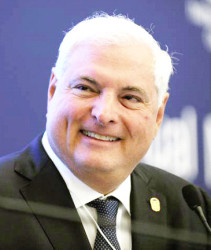WASHINGTON/MEXICO CITY, (Reuters) – A U.S. federal judge identified the former president of Panama, Ricardo Martinelli, as one of several alleged co-conspirators in a bribery scheme that helped SAP to sell millions of dollars in software to Panama, according to a document reviewed by Reuters.

The reference to Martinelli as a co-conspirator, which has not been previously reported, comes as the former president faces unrelated allegations of corruption and misconduct in Panama – accusations he has said are politically motivated.
Martinelli’s name came to light in the U.S. bribery case against Vicente Garcia, a former executive at SAP, the German software company. Garcia, 65, was sentenced to 22 months in prison on Dec. 16 by a U.S. court in the Northern District of California, after pleading guilty to conspiring to bribe Panamanian officials to secure contracts for SAP software.
In Judge Charles R. Breyer’s order on sentencing, he instructed Garcia to avoid contact with “any co-conspirator in this case,” naming Martinelli and six others, as a condition of his future supervised release. That order was released publicly on Dec. 22, before being sealed by the following day.
Martinelli has not been charged with any wrongdoing in Garcia’s case. A U.S. attorney for Martinelli said the former president had never met Garcia.
An SAP spokesman said the company fired Garcia in April 2014 and is cooperating in the ongoing investigation. The spokesman pointed out that the U.S. Securities and Exchange Commission, which conducted a parallel investigation, has said Garcia “circumvented SAP’s internal controls” to fund the bribe payments.
A U.S. Justice Department spokesman said the SAP investigation is ongoing and declined to comment further.
SAP has not been charged.
People familiar with the case confirmed that whether Martinelli received bribe payments in the scheme has been part of the Justice Department’s investigation.
TARGETED THREE OFFICIALS
Garcia admitted using bribe payments to secure a software contract to update technology for Panama’s social security agency.
The scheme, which ran from 2009 until 2013, won an SAP reseller a $14.5 million contract. SAP itself received around $2.1 million in software sales thanks to the bribes, according to court records.
An attorney for Martinelli in Panama, Rogelio Cruz, said there is no proof in the Panama cases against the former president, who governed the country from 2009-2014. “I have no doubt that there’s a political ingredient in all this,” he said.
Cruz said he had not discussed with Martinelli the judge’s order referring to Martinelli as a co-conspirator.
A U.S.-based attorney for Martinelli, who asked not to be named, said the former president “has no knowledge of He has never met him. He has never spoken to him, and doesn’t know anything about the contract or Garcia’s role in it.”
A contract of this kind, this attorney added, would not have reached the president’s desk. Martinelli moved to Miami several months ago, and no U.S. law enforcement authorities have approached the former-president on the issue, the attorney told Reuters.
Lawyers for Garcia, did not respond to several requests for comment.
In court records, the government said Garcia and his unidentified accomplices targeted three unnamed Panamanian officials with bribe payments through fake invoices and sham consulting contracts in an effort to win the deal.
The government named one of the officials as “Official C” and said he was a “very senior” official who “had substantial influence over the award of Panamanian government contracts.” Garcia tried to influence that official through bribe payments to a “close relative,” the government said in court papers.
In a Dec. 10 memo to the court asking for a lenient sentence, Garcia claimed Martinelli was that senior official. The family member was Martinelli’s brother-in-law, Aaron “Roni” Mizrachi, who was paid a “commission,” Garcia claimed.
Garcia said he was unsure whether the payments through Mizrachi ultimately reached Martinelli. Garcia “viewed Mizrachi as a gatekeeper who was leveraging his family relationship with President Martinelli to obtain bribes for himself,” he said.




